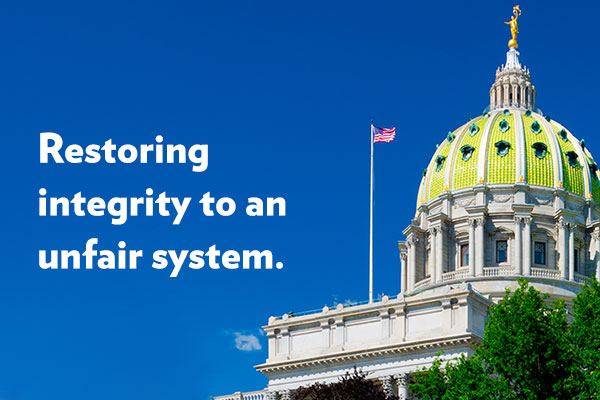Fact Sheet

Public-Sector Unions Two Years After Janus v. AFSCME
On June 27, 2018, the Supreme Court ruled in Janus v. AFSCME that all workers are entitled to their First Amendment rights—whether they choose to belong to a public sector union or not. The ruling freed workers from paying fees to a union to which they don’t belong. Two years later, public sector workers are still fighting for greater protection.
While some Pennsylvania unions have begun amending their contracts in response to worker demands, state leaders must choose people over politics and continue restoring workers’ free speech and free association rights by passing comprehensive public-sector union reform.
Union Membership Declines
- Janus immediately freed over 30,000 fee-payers in Pennsylvania from paying forced union fees. Since then, and despite union and legal roadblocks, the membership rate has declined.
- The Bureau of Labor Statistics union membership data for 2019, the first full reporting year since Janus, shows the public sector national membership rate declined 0.3%–or about 100,000 less workers–to the lowest rate since reporting began in 1983.
- Pennsylvania gained union members due to increased government employment. However, the unionization rate dropped 0.4%.
Public Employee Lawsuits Instigate Contract Changes
- Workers continue suing for more rights with over 90 lawsuits filed in state and federal courts since the Janus decision, and these cases are starting to have policy implications.
- Many lawsuits challenge maintenance of membership, a provision in statute and union contracts limiting when members can resign. Unions use these provisions to continue taking dues from members after they resign.
- A recent example is a June 2020 lawsuit from Elizabeth McKeon. A Pennsylvania hospital clerk typist, she resigned from the union AFSCME 13 last year, but they continued to take her wages for dues and political spending. She is suing for the right to resign and keep all of her paycheck.
- Under pressure from employee lawsuits, numerous state unions have removed maintenance of membership from their contracts, allowing more than 50,000 workers to resign union membership at will.
- In contrast, many teacher contracts continue to include not only maintenance of membership, but in some instances unconstitutional fair share fees.
- Seven state union contracts are under negotiation this year, in addition to contracts that have already expired. Without state law changes, they could retain provisions other union leaders and workers deemed unacceptable.
Union Political Activities Continue
- Pennsylvania public-sector unions have maintained political dues and political action committee (PAC) spending. Since 2007, they have spent $138.3 million on politics, including over $81 million in dues spending on “political activities and lobbying.”
- This includes Pennsylvania expenditures from national unions such as the National Education Association, which organized get out the vote activities for Joe Biden in the March 17 primaries while simultaneously demanding the shutdown of all the nation’s schools to minimize social contact. Similarly, the Service Employees International Union announced in February $150 million national spending in the 2020 election cycle, with Pennsylvania one of its eight top targets.
Two years after Janus, public employees have fought to maintain and expand their Janus protections, with some victories at the state contract level. However, there is still more work to be done to ensure that workers maintain their constitutional rights and dignity in the workplace. This can be accomplished by passing legislation to notify members’ of their rights (House Bill 785), restore their freedom to resign at any time (House Bill 506), and improve union accountability.